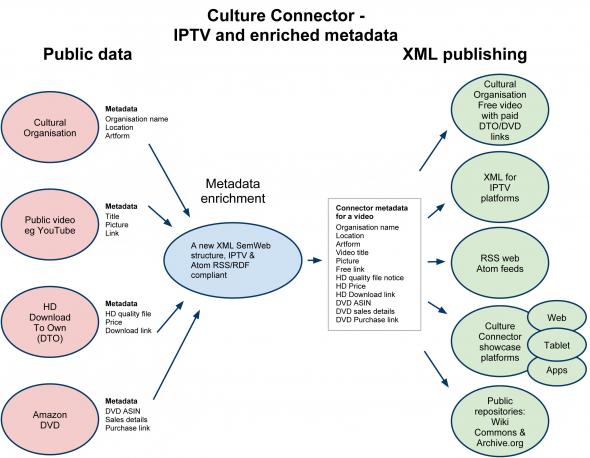Culture connector – IPTV and enriched metadata
Mute February 2011 – a project proposal
An IPTV video publishing service for UK cultural organisations, automatically enriching free video content’s metadata for IPTV compatibility and web distribution, adding additional functionality such as paid HD Download to Own (DTO) and DVD purchasing information.
Currently there are 1100 cultural organisations being funded on an annual basis by the UK’s Arts Councils, creating cultural productions on a daily basis that don’t reach their full potential audiences; locally, nationally or internationally. By using Semantic descriptions and combining numerous sources of public data we can create enriched RSS/RDF data to distribute their video productions to the web and new IPTV platforms. Importantly we look to provide revenues to these cultural organisations, from HD DTO and DVD sales.
In 2010 we made an online video RSS collector, with 40 organisations videos at linkme2.net/ov and this planted the seed of what could be achieved by connecting different metadata sources.
The project is Open Source and embedded in a peer-led cultural and technology learning community called TheKnowledge, where we would foster further developments of Semantic web and IPTV technologies.
Description
The idea and its potential market impact
Our use case scenario runs like so. A cultural organisation has already budgeted and produced a project with an accompanying, free YouTube educational video. To help that organisation gain ticket purchases for their next workshop event and to sell HD DTO copies of the video, our service would combine a number of public data sources to create new enriched metadata, distributed to IPTV platforms and the web, with paid content links. The example data sources for inclusion would be; YouTube, the organisation's details and location, Amazon ASIN product data and HD DTO data.
Over 2010 we researched the 275 cultural organisations supported by Arts Council England, London, and found 15% publishing RSS video metadata (approximately 40 organisations). Working within their normal budgets, these individual organisations cannot individually produce modified RSS data to be IPTV compliant. Our service addresses this issue by re-authoring these existing feeds.
In the study we would expect a similar 15% of the national count of 1100 cultural organisations to be producing video RSS data, giving us 165 organisations to work with for the study. This model could then be applied to the Galleries, Libraries, Museums and Archives (GLAM) sector, which is made up of 8000* organisations, or the idea could transposed to another specialist area currently producing free online video, such as in the sciences.
*Museums Libraries & Archives (MLA), figures from their website.
What you propose to do in the study
Which IPTV platform will be successful and how video content is channelled/curated/organised is presently uncertain. Because of this uncertainty, we will look to prepare a data structure that is platform independent and versatile, and, for IPTV purposes, use YouView’s metadata model as a benchmark to build on. To assure broadest visibility and use, we will nonetheless commence development outside of YouView, focusing instead on engaging a large number of content producers and presenting them with a working prototype for business models which run on attaching paid content links to free content.
Our plan has three parallel strands; 1) communicating with and collecting data from the cultural organisations, 2) designing and building the data model for enriched video metadata, and 3) building the showcase platform. Bringing the cultural organisations on board is key, meaning we will pay great care to copywriting and ensuring reliable ways to record data are enshrined in the system.
The deliverable
To demonstrate the amount of content coming through the video metadata system, we will deliver a showcase platform for web, tablet and mobile. This would be updated automatically to show new free video content as it is published, as well as links to paid content through HD DTO and Amazon DVD links where available. This would be built on top of the RSS collecting and video display technology we have used in the past to display London cultural producers free video content linkme2.net/ow
The service would also produce datafeeds for use in IPTV and on the web, as RSS and video embed codes, again carrying the HD DTO and DVD purchasing information.
Our target would be to have at least 165 organisations' free video feeds in the system, being updated on a daily basis as they publish new video online.
We will implement and document an XML/RDF structure for video content redistribution on the web and IPTV to include the following information; the cultural organisation, its location, artform, artist, video information and links for free content, paid HD DTO and DVD purchasing opportunities.
Mute Books Orders
For Mute Books distribution contact Anagram Books
contact@anagrambooks.com
For online purchases visit anagrambooks.com







